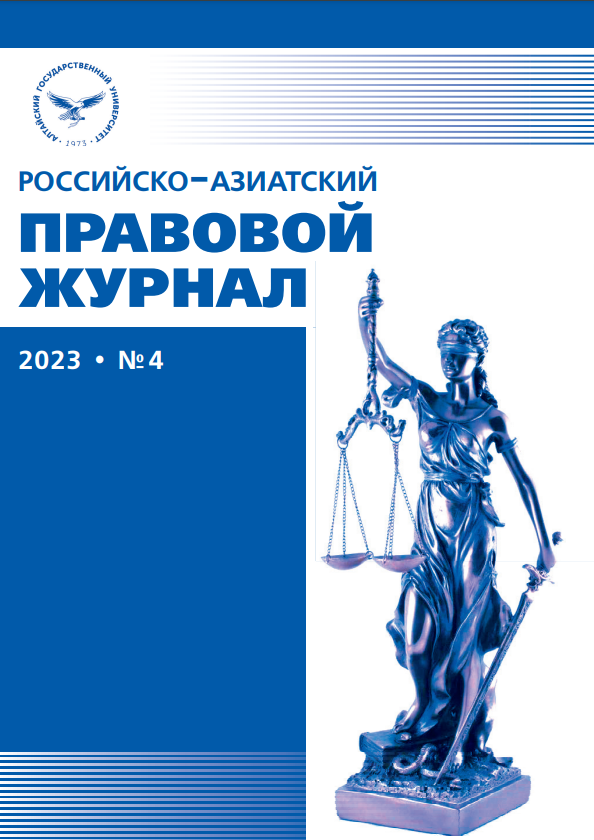EXAMPLE CRIMINOLOGICAL DETERMINANTS OF THE SPREAD OF THE IDEOLOGY OF TERRORISM IN EDUCATIONAL ORGANIZATIONS OF HIGHER EDUCATION AND PROFESSIONAL EDUCATIONAL ORGANIZATIONS
УДК 343.235.7 ББК 67.408.131.11
Abstract
The article examines the facts of the spread of the ideology of terrorism in educational organizationsas manifestations of «idealistic» terrorism, according to the classification proposed by Yu.M. Antonyan.From the point of view of criminology, terrorism is understood as a diverse phenomenon. In this regard,it is necessary to determine what type of terrorism educational organizations face. Next, it is necessary tohighlight the determinants of the spread of the ideology of terrorism in educational organizations.The analysis of criminal cases according to the elements of Art. 205.2 of the Criminal Code of theRussian Federation and a survey of teachers and teachers of a number of educational organizations in theAltai Territory makes it possible to determine the determinants of the spread of the ideology of terrorismin educational organizations. The traditional division of the determinants of crime into general social,socio-psychological and personal needs to be clarified in relation to terrorist crimes committed by youngpeople studying in educational organizations. Among the general social determinants of terrorist crime in educational organizations, the main role is played by the social qualities of young people. Among the sociopsychological determinants, the main role is played by shortcomings in family education and the formalismof preventive measures. The analysis of criminal cases allows us to conclude that among the families of thoseaccused and on trial for committing terrorist crimes in educational organizations, pedagogically incorrectlyoriented families prevail, where, for one reason or another, psychological contact with the child has notbeen established.
Downloads
References
Статистические данные по преступлениям террористической направленности на территории России // Обзор. НЦПТИ. 2021. №4 (27). С. 15.
Об образовании в Российской Федерации : Федеральный закон от 29.12.2012 г. №273-ФЗ // Собрание законодательства Российской Федерации. 2013. №41. Ст. 3315.
О государственной информационной системе «Современная цифровая образовательная среда» : постановление Правительства РФ от 16.11.2020 г. №1836 // Собрание законодательства Российской Федерации. 2020. №54. Ст. 5241.
Уголовный кодекс Российской Федерации от 13.06.1996 №63-ФЗ // Собрание законодательства Российской Федерации. 2022. №23. Ст. 5465.
Прозументов Л.М., Шеслер А.В. Отечественные научные концепции причин преступности // Криминологический журнал. 2014. №1 (27). С. 49–58.
Будницкий О.В. Терроризм в российском освободительном движении: идеология, этика, психология (вторая половина XIX — начало XX в.). М. : Политическая энциклопедия, 2016. С. 30.
Овчинский В.С. ХХI век против мафии. Криминальная глобализация и Конвенция ООН против транснациональной организованной преступности. М., 2001. С. 8–9.
Фромм Э. Человек для себя. Революция надежды. Иметь или быть. М., 2007. С. 137.
Обрывко Е.И., Стародубцева М.А., Саенко А.А. О некоторых аспектах повышения правовой культуры в вопросах профилактики экстремизма и идеологии терроризма в образовательной среде // Гуманитарные, социально-экономические и общественные науки. 2020. №11–1. С. 81–83.
Russian-Asian Law Journal is a golden publisher, as we allow self-archiving, but most importantly we are fully transparent about your rights.
Authors may present and discuss their findings ahead of publication: at scientific conferences, on preprint servers, in public databases, and in blogs, wikis, tweets, and other informal communication channels.
Russian-Asian Law Journal allows authors to deposit manuscripts (currently under review or those for intended submission) in non-commercial, pre-print servers such as ArXiv.
Authors who publish with this journal agree to the following terms:
- Authors retain copyright and grant the journal right of first publication with the work simultaneously licensed under a Creative Commons Attribution License that allows others to share the work with an acknowledgement of the work's authorship and initial publication in this journal.
- Authors are able to enter into separate, additional contractual arrangements for the non-exclusive distribution of the journal's published version of the work (e.g., post it to an institutional repository or publish it in a book), with an acknowledgement of its initial publication in this journal.
- Authors are permitted and encouraged to post their work online (e.g., in institutional repositories or on their website) prior to and during the submission process, as it can lead to productive exchanges, as well as earlier and greater citation of published work (See The Effect of Open Access).








